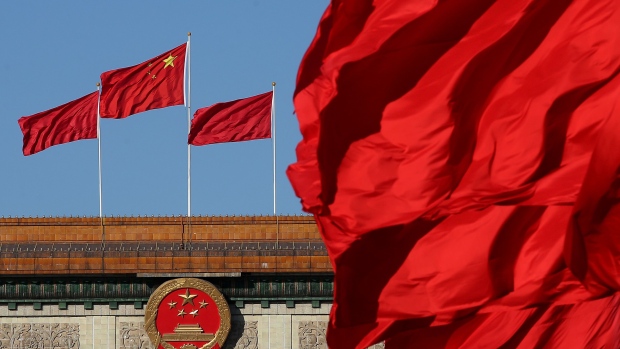Sep 20, 2022
US Urges China to Step Up to Tackle Rising World Debt-Overhang Risk
, Bloomberg News

(Bloomberg) -- A top US Treasury official urged China -- by far the world’s largest bilateral official creditor -- to take part in coordinated debt relief for vulnerable nations to avoid the specter of a systemic sovereign-debt crisis.
“Failure to act on these debts could imply years of ongoing difficulties with the servicing of debts and with underinvestment and lower growth in low- and middle-income countries,” Brent Neiman, a counselor to US Treasury Secretary Janet Yellen, said in a discussion hosted by the Peterson Institute for International Economics Tuesday.
While China is not the only creditor “holding back quick and effective” help, its lack of participation in coordinated debt relief across the international landscape “is the most common and the most consequential,” he said.
China, which has come under criticism for its lending practices to poorer nations, accounts for almost 40% of the bilateral and private-creditor debt that the world’s poorest countries need to service this year, according to the World Bank. It has helped forge recent debt-relief agreements, participating in the Group of 20 suspension of repayments during the pandemic.
About 60% of low-income countries are at high risk of or already in debt distress, with about 25% of emerging-market nations in the same situation as they borrowed and spent to weather the pandemic and subsequent food and energy shocks spurred by Russia’s invasion of Ukraine, according to the International Monetary Fund.
Distressed Debt
Surging inflation has unleashed a series of interest-rate increases worldwide by central banks, led by the Federal Reserve’s aggressive moves, which has supercharged the dollar. Meanwhile, developing nations have amassed a quarter-trillion dollar pile of distressed debt that threatens to create a historic cascade of defaults.
Estimates of the total stock of Chinese official loans outstanding range widely from roughly $500 billion to $1 trillion, concentrated in low and middle-income countries, Nieman said. As many as 44 nations now owe debt equivalent to more than 10% of their gross domestic product to Chinese lenders, after factoring in both on- and off-balance-sheet liabilities, he said.
Group of Seven finance ministers in May called out China, urging creditor countries to help developing nations struggling with debt.
In August, China said it will forgive 23 interest-free loans to 17 African countries and redirect $10 billion of its IMF reserves to nations on that continent.
But a study by the Boston University Global Development Policy Center estimates the latest relief would just amount to between $45 million and $610 million -- or about 1% of what the continent owes China. It was difficult to determine an exact figure because of a lack of public information, it said.
The worsening debt burden comes after the expiration in December 2021 of the so-called Debt Service Suspension Initiative adopted by the G-20 to suspend or revamp debt repayments by low-income countries during the Covid-19 pandemic.
Common Framework
The G-20 has also set up a so-called Common Framework that brings the Paris Club of traditional rich debtor countries together with China to try to restructure the debts of low-income countries on a case-by-case basis.
Chad, Ethiopia and Zambia are the only three Common Framework cases to date, and delays in reaching resolution mean “suffering and uncertainty, may discourage others from requesting needed treatments, and preclude the best outcomes,” Nieman said.
On Aug. 31, Zambia won IMF board approval for a $1.3 billion support package, an important step toward the nation restructuring its debt and a boost for the Common Framework.
“Now that the IMF program for Zambia has been approved, it is vital that creditors move expeditiously to hash out, and then transparently meet, the terms of the debt treatment,” he said.
Increasing the scale of high-quality development financing through multilateral development banks -- by stretching their existing resources and using them to mobilize private capital -- will be “a major focus” of the Treasury’s engagements at the IMF and World Bank annual meetings in Washington in October, Nieman said.
(Updates with more comment from Nieman in 13th paragraph.)
©2022 Bloomberg L.P.






